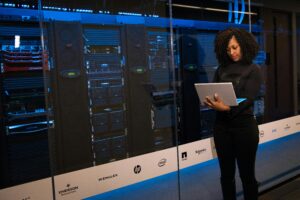In Good Will Hunting, there’s a scene where our eponymous working class character confronts a Harvard snob with the hard truth of his pricey education: “You dropped 150 grand on an education you could’ve gotten for a $1.50 in late charges at the public library.”
The populist notes of the film ring out. There’s a swell of rebellious energy, one that enshrines a few big old American ideals: namely, that knowledge is democratic and that the best thinkers are self-made.
And it’s true that, at least in American society, many of the tools of education are free and at our disposal. Right now, in the age of YouTube, we are better equipped than ever to be autodidacts. Want to sit in on a lecture at Harvard? Yale? Done. They’re online. Hundreds of thousands of papers, books, videos, and the means to interpret them can all be found there as well. However, the fact remains: despite the cornucopia of knowledge residing in the media, we aren’t all self-taught genius Will Huntings. In fact, the state of education in this country remains shaky. But why?
“It takes more willpower or self-control than most people have,” says YouTube star and science educator Derek Muller. “Maybe one out of 100,000 can do it, but it’s not going to change, really, what’s happening in the education system. As we’ve seen, it really hasn’t changed, despite MIT OpenCourseWare, all of this free great education being online. It hasn’t changed the game. And I think we need to look at this with open eyes and say, ‘Why hasn’t it?’”
It’s a question that’s captivated Muller since before he finished his PhD in science education at the University of Sydney. In his thesis, Muller reveals that the pool of research on the effectiveness of multimedia approaches in education (e.g., using videos, interactive websites, graphics, etc.) is pretty shallow. For instance, over the last hundred years, many teachers, students, and businesses have operated under the assumption that a lesson that incorporates different media will always work better than one that doesn’t – that teaching someone a concept through a fun video is infinitely better than teaching someone through a dry lecture. In fact, Thomas Edison predicted that learning through film would replace traditional textbook methods as early as the 1930s. What Muller discovered during his research, though, was that despite decades of believing that multimedia improved education, there wasn’t much actual data to support that conclusion. As Muller says, intuitively the idea that media-enhanced learning would be better makes sense, but then again intuition isn’t the basis for scientific thinking.
While preparing his thesis, Muller concocted an experiment to measure just how much people could learn by watching a video about science. In one instance, participants watched a highly accessible, fun video that explained a bit of Newtonian physics. After the video, they reported feeling confident that they understood the concept a lot better than before watching. However, in spite of this confidence, participants’ post-video scores did not differ significantly from their pre-video scores. In other words, they felt smarter because they watched a video about science, but when it came down to it, they were really right back where they started.
 However, in another experiment, Muller had participants watch a video that was a little more puzzling. Rather than just giving the viewer information about physics, it asked them questions. It sparked a dialogue. The effects of this video were inverted. Participants felt less confident that they knew about the subject, but scored significantly higher on their post-video test, meaning that, through their confusion, through being challenged by an idea, they learned something.
However, in another experiment, Muller had participants watch a video that was a little more puzzling. Rather than just giving the viewer information about physics, it asked them questions. It sparked a dialogue. The effects of this video were inverted. Participants felt less confident that they knew about the subject, but scored significantly higher on their post-video test, meaning that, through their confusion, through being challenged by an idea, they learned something.
These results, along with others from Muller’s study, help explain why we’re not all professors in the age of free online video courses. As Muller says, “Access to information is not the problem. We had that problem 500 years ago, but it hasn’t been a problem for the last 20, or last 30 years. In the same way, there are fat people out there. There are gyms out there. And there are fat people with gym memberships. The point is that the limiting factor preventing people from not learning is not access to information.”
So, uniquely armed with an understanding of just how video can be used to transmit knowledge, Muller set out on a quest to popularize physics on the internet, with great success; as this is written, Muller’s two Veritasium (a play on veritas, the Latin word for truth) channels have a combined subscriber count of four million.
[/vc_column_text][vc_video link=”https://www.youtube.com/watch?v=UBVV8pch1dM” align=”center”][vc_column_text]Muller’s videos have many of the trademarks of shareable online content. They’re high-energy, positive, well-produced, and funny. But what separates them from much of the other online content out there is their use of Muller’s research on science video education. That is, instead of hand feeding viewers information about science, Muller’s videos are more contemplative. They make use of a lot of classic, Socratic techniques. In fact, they often begin with a question, like “Why do the most venomous species live in the warmest climates on earth?” or “Why are there sometimes spikes on my ice cubes after I freeze them?”
Standing before a packed auditorium at this year’s annual NSTA STEM Forum & Expo, Muller was able to get the attention of the entire audience with a fairly humble prop. “What’s going to happen when I drop this?” he asked, holding a slinky out at arm’s length. “Will it all fall at once? Will the top fall before the bottom? Perhaps the bottom will fall before the top? Or maybe the bottom will rise up to the top first?”
It’s an experiment featured in several of Veritasium’s viral videos. In one of these (and in true YouTuber fashion), Muller ups the ante by dropping a giant slinky out of the window of a skyscraper (I won’t reveal what happens). It makes for a fantastic effect. But, as discussed, isn’t this sensationalism part of the problem when it comes to media-based science education. “It might seem paradoxical,” I tell him, “that, here you are, one of the biggest YouTube science video producers out there, and you’re also somewhat of a skeptic of video education, an advocate of many traditional methods.”
“I think it comes down to objective,” Muller replies. “If your objective is to replace teachers to change the school system and all that, overthrow it using steady online curriculum made of videos, it’s just, I think, woefully ineffective.”
“Teachers play a fundamental role in education,” he maintains. “You have to know them on a personal basis. You have to be accountable to them. You have to work with them, be inspired by them, get their mentorship. You have to feel like someone cares about you, instead of just slogging away by yourself.”
Still, because of his prior research, Muller can claim that video (when used intelligently) can make a difference as a teaching tool: “If you want little nuggets of inspiration, and the spreading of ideas that people have never thought about, then it can serve that purpose very well. I think as long as you’re clear about what your purpose is and that you’re using the attributes of the medium to achieve that.”
Looking through the comments sections of several Veritasium videos (normally a bad idea on YouTube), what I find more frequently than anything else are questions: “But what if this happens?” “What if you do this next?” Viewers seem genuinely curious, perhaps because they’re genuinely confronted by the new ideas. In this way, Muller’s methods take us back to the root of scientific thinking – the challenge of not knowing – that began for so many of us in the backseat of a car as we asked our parents, Why?…Why?…Why?
You can find Derek Muller’s YouTube channel by searching “Veritasium.” Muller is also slated to appear as a correspondent in the new Netflix series Bill Nye Saves the World.
by P.K. French
Photos courtesy of Derek Muller.









